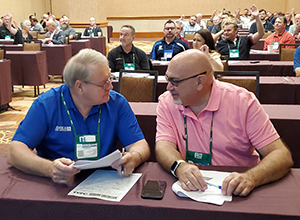EASA Accreditation Program
Showcase your service center's compliance with ANSI/EASA AR100
STEPS TO BECOME ACCREDITED AUDIT CHECKLIST SUPPORTING DOCUMENTS
APPLY ONLINE RENEW EXISTING ACCREDITATION
 It has been proven that electric motor efficiency can be maintained during repair and rewind by following defined good practices. EASA has developed an international accreditation program for service centers based on the sources of these good practices, namely ANSI/EASA AR100: Recommended Practice for the Repair of Rotating Electrical Apparatus and the Good Practice Guide based on the 2019 and 2003 Rewind Studies of premium efficiency, energy efficient, IE2 (formerly EF1) and IE3 motors, by EASA and the Association of Electrical and Mechanical Trades (AEMT).
It has been proven that electric motor efficiency can be maintained during repair and rewind by following defined good practices. EASA has developed an international accreditation program for service centers based on the sources of these good practices, namely ANSI/EASA AR100: Recommended Practice for the Repair of Rotating Electrical Apparatus and the Good Practice Guide based on the 2019 and 2003 Rewind Studies of premium efficiency, energy efficient, IE2 (formerly EF1) and IE3 motors, by EASA and the Association of Electrical and Mechanical Trades (AEMT).
To achieve EASA Accreditation, service centers undergo third-party evaluation to assure that they are using prescribed good practices to maintain motor efficiency and reliability during electrical and mechanical repairs of electric motors. The program accomplishes this by use of independent, third-party auditors.
Scope of the program
Three-phase, squirrel-cage motors that are repaired in accredited service centers. As such, the scope of the program includes mechanical repairs as well as electrical rewinding.
Highlights
- Designed to assure usage of prescribed good practices
- Helps maintain motor efficiency and reliability during repair
- Covers 23 categories and more than 70 criteria elements
(See the Audit Checklist with Explanations for details) - External audits are conducted by independent, third-party auditors
What Is the Financial Commitment?
FEES CHARGED BY EASA
The cost to enter the program is $300 for members, $1500 for non-members (non-refundable), which must be paid prior to selecting an auditor. The enrollment fee includes a supply of 100 Accreditation Program motor labels which will be shipped to service centers that successfully complete their initial third-party (on-site) audit. Additional labels may be purchased. Every third year, prior to subsequent third-party audits, a non-refundable renewal fee must be paid ($300 for members, $1500 for non-members).
FEES CHARGED BY AUDITORS
EASA-sanctioned auditors will charge applicants separately for external (on-site) audits. Audit firms may also charge for reviewing and approving annual internal audits. Contact auditors for pricing details.
What Will You Get?
Successfully completing the EASA Accreditation process will give you:
- Company listing as an EASA-Accredited repair firm on EASA’s website.
- The EASA-Accredited logo appearing on the company profile in “Find a Member” lookups on EASA’s website.
- A customized EASA-Accredited logo for use on your website, letterhead, line cards, and all promotional materials.
- The right to place serialized EASA Accredited Repair labels on accredited repairs. (You’ll receive 100 labels at no charge when your accreditation is approved; additional labels are available for purchase in packages of 100.)
- A customized EASA Accreditation Certificate for your office and a PDF copy for use in your marketing materials.
- A press release that announces your accreditation and explains the importance of EASA Accreditation for maintaining or improving the efficiency and reliability of repaired motors.
- Announcement of your accreditation in EASA’s newsletter, Currents, and in EASA's social media platforms.
Accreditation Checklist
| The EASA Accreditation Program utilizes a checklist consisting of 23 categories for more than 70 mandatory criteria elements. The auditor evaluates each criteria line item for evidence of conformity by review of applicable service center repair documents or by observation of service center practices. Review of the calibration status of associated equipment is also performed by the auditor. (Note: Calibration requirements apply to all instruments included in the required equipment list. However, instruments not in the required equipment list are not required to be calibrated because they are outside the scope of the program.) | |
|
For audits performed Audit Checklist Audit Checklist with Explanations |
|
Supporting Documents


The criteria for the EASA Accreditation Program are based on the good practices found in ANSI/EASA AR-100: Recommended Practice for the Repair of Rotating Electrical Apparatus and The Good Practice Guide to Maintain Motor Efficiency. Service centers wishing to become accredited should download, review and become familiar with these publications.
ANSI/EASA AR100-2020
ABOUT AR100 & WHAT'S NEW IN 2020 VERSION
Good Practice Guide to Maintain Motor Efficiency
Based on the 2019 and 2003 Rewind Studies of premium efficiency, energy efficient, IE2 (formerly EF1) and IE3 motors
Guía de Buenas Prácticas Para Conservar la Eficiencia del Motor
Basada en los Estudios de Rebobinado de motores de eficiencia premium, energético eficientes, IE2 (antigua EF1) e IE3 realizados en 2019 y en el 2003
Other helpful resources

 Having trouble finding time for training? Check out the how-to videos in EASA’s new series Electric Motor Repair Tips.
Having trouble finding time for training? Check out the how-to videos in EASA’s new series Electric Motor Repair Tips.

